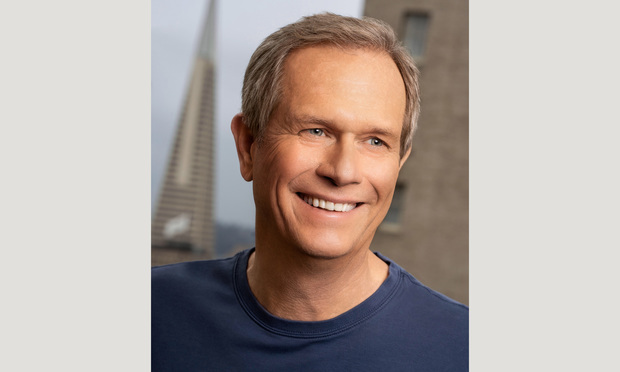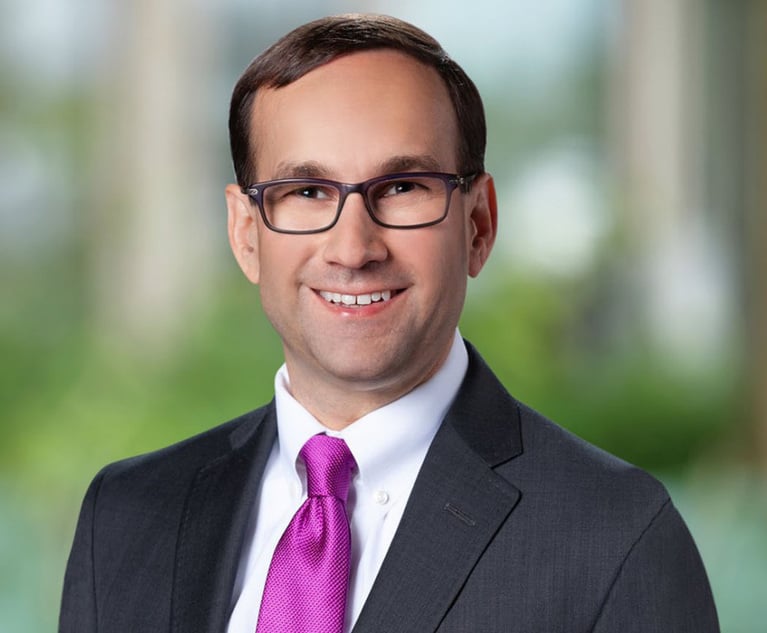Acting With Integrity at Work and in Community During COVID-19: A Q&A With Airbnb Chief Ethics Officer Robert Chesnut
"A small act of recognition for an act of integrity is how I think you encourage people to do more," Chesnut said.
April 21, 2020 at 01:45 PM
7 minute read
 Rob Chesnut, chief ethics officer at Airbnb.
Rob Chesnut, chief ethics officer at Airbnb.
As the chief ethics officer at San Francisco-based Airbnb Inc., Robert Chesnut oversees a team of 30 ethics advisers who are spread out within the company. His theory is that if ethics is controlled by one person or one department, employees are less likely to bring up ethical issues or questions.
"If ethics is something that is owned by legal or human resources, people get intimidated. If you have someone who is on your team who is in charge of ethics you're a lot more likely to have that conversation," Chesnut said.
In a time where the new coronavirus is on everyone's mind, employees and their employers must think about ethics and acting with integrity. He said employees need to think about conflicts of interest they may have if they want to freelance or begin serving on boards of directors.
He also said it is a time where companies and executives should be finding ways to help their communities. Chesnut, for example, spearheaded an initiative in the Bay Area that allows for companies to donate their snacks to a family homeless shelter. Since he shared the initiative on LinkedIn, others have joined and he's received emails from people across the country who are doing something similar with their local homeless shelters.
This conversation has been edited for length and clarity.
Corporate Counsel: During the pandemic what are some of the ethical issues you find that employees are concerned about?
Robert Chesnut: There are certain things that raise ethical or reporting concerns that aren't applicable anymore. There may be issues around alcohol or sexual harassment that you do not see in this environment.
However, you may see someone post something in Slack, or they'll say something that may create an issue. You still have people who want to be advisers or board members that want to discuss conflict of interest issues. There are people who want to do outside consulting work that could raise conflict issues.
CC: What are some ethical issues companies should be aware of as they navigate through the COVID-19 pandemic?
RC: The No. 1 ethical issue is taking care of your employees. This will vary on how the business is impacted.
But what if you're a grocery store? The world is not safe enough for most of us to go out. But your workers are expected to go out and interact with the public and handle a volume of business that is a substantial increase. A primary consideration has to be, "Are my people safe?"
On the other side of it, you have folks who are trying to work from home. You've got to be aware of how your people are going to feel in this type of a new world. Some of them might have two or three kids who are doing remote school. They may be feeling isolated.
A crisis like this sort of pressure tests your character as a company. How you handle it can really have a substantial impact that will linger on long after this is over.
You may need to lay people off just to survive. It shouldn't be your first step. From an ethical perspective, you've got to be looking at other things.
I think leaders have to sacrifice first. In a time like this, you can't be laying people off and still be collecting your full salary. You can do it, but you're not only going to lose the respect of people you lay off, but you'll also lose the respect of your customers.
You have to think creatively about how you can pivot. How you change the way that you operate as a business. The obvious examples are restaurants. I've seen stories of restaurants selling prepared meals in grocery stores, which is a good way to shift.
CC: Is seeing companies shifting to adapt their businesses and help others what inspired you to begin making the "Integri-Yeti" videos on LinkedIn?
RC: Yes. I think that a crisis can bring out a lot of good in people. In my book, one of the things I talk about is that you get the behavior you reward, but nobody ever rewards integrity. How many companies do anything at all to recognize integrity? Not very many.
Yeti can do these nice water bottle coatings that you can put your logo on. I put the Airbnb logo on a water bottle. We market the ethics program and Airbnb; it has branding that is consistent with the company's branding. We branded our internal ethics program and called it "Integrity Belongs Here."
When we have different meetings around the company or someone sends in a good question to the ethics email address, we recognize them and give them one of these water bottles. It doesn't sound like a lot, but when I give these things out in a group of 100 people will start clapping because you are recognizing somebody who has the courage to speak up. You want to make that something you reward.
A small act of recognition for an act of integrity is how I think you encourage people to do more.
CC: How did you become involved in donating office snacks to local homeless shelters?
RC: There is a nonprofit group of homeless family shelters in the Bay Area called LifeMoves. It is a great organization and they have had an issue because they get food from restaurants but now the restaurants are closed.
They have been reaching out to the community asking for help. They were talking to me about how they needed snacks. We came up with the idea that you have all of these offices closed around the Bay Area and a lot of these companies have snacks for their employees, but the snacks are going stale.
I posted about this and the reaction I got was overwhelming. Over 20 companies have donated snacks because people saw this post, shared it, wrote about what a wonderful idea it was. Now I'm getting emails every day from different companies saying they'd like to donate their snacks. I've also gotten emails from people in different parts of the country who have told me that they have donated snacks to their local shelter.
Come up with some way you can help, and that can inspire other people to do good things as well.
CC: Is the silver lining of the pandemic that it will give people a better idea of how they can help their communities?
RC: I've seen a lot of that. The world needs companies to step up. We all want to be a part of a company that does more than just make money. We want to feel like our work has some broader purpose in the world. I think that the world is moving in this direction and the crisis is encouraging even more of this.
This content has been archived. It is available through our partners, LexisNexis® and Bloomberg Law.
To view this content, please continue to their sites.
Not a Lexis Subscriber?
Subscribe Now
Not a Bloomberg Law Subscriber?
Subscribe Now
NOT FOR REPRINT
© 2025 ALM Global, LLC, All Rights Reserved. Request academic re-use from www.copyright.com. All other uses, submit a request to [email protected]. For more information visit Asset & Logo Licensing.
You Might Like
View All
From Reluctant Lawyer to Legal Trailblazer: Agiloft's GC on Redefining In-House Counsel With Innovation and Tech
7 minute read
People and Purpose: AbbVie's GC on Leading With Impact and Inspiring Change
7 minute read
From Olympic Aspirations to Legal Innovation: Tom Dunlop's Journey to Founding Summize
8 minute read
'Am I Spending Time in the Right Place?' SPX Technologies CLO Cherée Johnson on Living and Leading With Intent
9 minute readTrending Stories
- 1States Accuse Trump of Thwarting Court's Funding Restoration Order
- 2Microsoft Becomes Latest Tech Company to Face Claims of Stealing Marketing Commissions From Influencers
- 3Coral Gables Attorney Busted for Stalking Lawyer
- 4Trump's DOJ Delays Releasing Jan. 6 FBI Agents List Under Consent Order
- 5Securities Report Says That 2024 Settlements Passed a Total of $5.2B
Who Got The Work
J. Brugh Lower of Gibbons has entered an appearance for industrial equipment supplier Devco Corporation in a pending trademark infringement lawsuit. The suit, accusing the defendant of selling knock-off Graco products, was filed Dec. 18 in New Jersey District Court by Rivkin Radler on behalf of Graco Inc. and Graco Minnesota. The case, assigned to U.S. District Judge Zahid N. Quraishi, is 3:24-cv-11294, Graco Inc. et al v. Devco Corporation.
Who Got The Work
Rebecca Maller-Stein and Kent A. Yalowitz of Arnold & Porter Kaye Scholer have entered their appearances for Hanaco Venture Capital and its executives, Lior Prosor and David Frankel, in a pending securities lawsuit. The action, filed on Dec. 24 in New York Southern District Court by Zell, Aron & Co. on behalf of Goldeneye Advisors, accuses the defendants of negligently and fraudulently managing the plaintiff's $1 million investment. The case, assigned to U.S. District Judge Vernon S. Broderick, is 1:24-cv-09918, Goldeneye Advisors, LLC v. Hanaco Venture Capital, Ltd. et al.
Who Got The Work
Attorneys from A&O Shearman has stepped in as defense counsel for Toronto-Dominion Bank and other defendants in a pending securities class action. The suit, filed Dec. 11 in New York Southern District Court by Bleichmar Fonti & Auld, accuses the defendants of concealing the bank's 'pervasive' deficiencies in regards to its compliance with the Bank Secrecy Act and the quality of its anti-money laundering controls. The case, assigned to U.S. District Judge Arun Subramanian, is 1:24-cv-09445, Gonzalez v. The Toronto-Dominion Bank et al.
Who Got The Work
Crown Castle International, a Pennsylvania company providing shared communications infrastructure, has turned to Luke D. Wolf of Gordon Rees Scully Mansukhani to fend off a pending breach-of-contract lawsuit. The court action, filed Nov. 25 in Michigan Eastern District Court by Hooper Hathaway PC on behalf of The Town Residences LLC, accuses Crown Castle of failing to transfer approximately $30,000 in utility payments from T-Mobile in breach of a roof-top lease and assignment agreement. The case, assigned to U.S. District Judge Susan K. Declercq, is 2:24-cv-13131, The Town Residences LLC v. T-Mobile US, Inc. et al.
Who Got The Work
Wilfred P. Coronato and Daniel M. Schwartz of McCarter & English have stepped in as defense counsel to Electrolux Home Products Inc. in a pending product liability lawsuit. The court action, filed Nov. 26 in New York Eastern District Court by Poulos Lopiccolo PC and Nagel Rice LLP on behalf of David Stern, alleges that the defendant's refrigerators’ drawers and shelving repeatedly break and fall apart within months after purchase. The case, assigned to U.S. District Judge Joan M. Azrack, is 2:24-cv-08204, Stern v. Electrolux Home Products, Inc.
Featured Firms
Law Offices of Gary Martin Hays & Associates, P.C.
(470) 294-1674
Law Offices of Mark E. Salomone
(857) 444-6468
Smith & Hassler
(713) 739-1250






